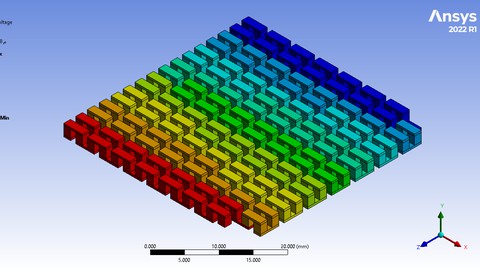
Simulate a Thermoelectric generator in ANSYS
Simulate a Thermoelectric generator in ANSYS, available at $19.99, has an average rating of 4.75, with 11 lectures, based on 17 reviews, and has 44 subscribers.
You will learn about Creating a geometry in SpaceClaim Assigning material in ANSYS Meshing a solid domain Simulating thermoelectric generators Generate contours of temperature and voltage Parametric analysis of the TEG performance This course is ideal for individuals who are Electrical engineers or Mechanical engineers or Researchers in energy harvesting It is particularly useful for Electrical engineers or Mechanical engineers or Researchers in energy harvesting.
Enroll now: Simulate a Thermoelectric generator in ANSYS
Summary
Title: Simulate a Thermoelectric generator in ANSYS
Price: $19.99
Average Rating: 4.75
Number of Lectures: 11
Number of Published Lectures: 11
Number of Curriculum Items: 11
Number of Published Curriculum Objects: 11
Original Price: $24.99
Quality Status: approved
Status: Live
What You Will Learn
- Creating a geometry in SpaceClaim
- Assigning material in ANSYS
- Meshing a solid domain
- Simulating thermoelectric generators
- Generate contours of temperature and voltage
- Parametric analysis of the TEG performance
Who Should Attend
- Electrical engineers
- Mechanical engineers
- Researchers in energy harvesting
Target Audiences
- Electrical engineers
- Mechanical engineers
- Researchers in energy harvesting
In this set of lectures, you will find the complete steps to simulate the thermoelectric generators inside ANSYS.
The course starts with geometry creation using SpaceClaim. A step-by-step guide on how to create the 3D model in the most flexible and easy way. The exact dimensions and placement of each component is explained in full detail supported with actual images of an actual commercial thermoelectric generator.
Following this, the different materials definitions and their assignments to various components of the TEG. The used materials are actual properties referenced from published scientific articles.
Next, you will see the meshing process. A good uniform mesh is formed. The mesh includes hexahedrons only. Detailed steps are shown and using connections between components are explained.
After that, the analysis settings and the definitions of boundaries’ conditions are explained in ANSYS Mechanical. Defining temperature boundaries and convection coefficients.
Finally, you will learn how to display the different results in different forms (Contours, exact values, etc…). Contours of temperature and voltage. Also, you will learn how to do parametric analysis. Variation of performance at different temperatures and the at different loads.
This is recorded using version 2021R1. The attached files can be opened in this version and any other later version released after 2021R1.
Course Curriculum
Chapter 1: Introduction
Lecture 1: Introduction
Chapter 2: Creating the geometry
Lecture 1: Starting with first component
Lecture 2: Creating first building block of the TEG
Lecture 3: Completing the thermocouples of the TEG
Lecture 4: Connecting all thermocouples
Lecture 5: Final adjustments
Chapter 3: model setup
Lecture 1: Materials
Lecture 2: Meshing
Lecture 3: Analysis settings
Chapter 4: Results
Lecture 1: Main output parameters
Lecture 2: Design points and performance evaluation
Instructors
-
Hesham Khalil
Assistant Professor at Kafrelsheikh University
Rating Distribution
- 1 stars: 0 votes
- 2 stars: 0 votes
- 3 stars: 0 votes
- 4 stars: 4 votes
- 5 stars: 13 votes
Frequently Asked Questions
How long do I have access to the course materials?
You can view and review the lecture materials indefinitely, like an on-demand channel.
Can I take my courses with me wherever I go?
Definitely! If you have an internet connection, courses on Udemy are available on any device at any time. If you don’t have an internet connection, some instructors also let their students download course lectures. That’s up to the instructor though, so make sure you get on their good side!
You may also like
- Top 10 Video Editing Courses to Learn in November 2024
- Top 10 Music Production Courses to Learn in November 2024
- Top 10 Animation Courses to Learn in November 2024
- Top 10 Digital Illustration Courses to Learn in November 2024
- Top 10 Renewable Energy Courses to Learn in November 2024
- Top 10 Sustainable Living Courses to Learn in November 2024
- Top 10 Ethical AI Courses to Learn in November 2024
- Top 10 Cybersecurity Fundamentals Courses to Learn in November 2024
- Top 10 Smart Home Technology Courses to Learn in November 2024
- Top 10 Holistic Health Courses to Learn in November 2024
- Top 10 Nutrition And Diet Planning Courses to Learn in November 2024
- Top 10 Yoga Instruction Courses to Learn in November 2024
- Top 10 Stress Management Courses to Learn in November 2024
- Top 10 Mindfulness Meditation Courses to Learn in November 2024
- Top 10 Life Coaching Courses to Learn in November 2024
- Top 10 Career Development Courses to Learn in November 2024
- Top 10 Relationship Building Courses to Learn in November 2024
- Top 10 Parenting Skills Courses to Learn in November 2024
- Top 10 Home Improvement Courses to Learn in November 2024
- Top 10 Gardening Courses to Learn in November 2024





















